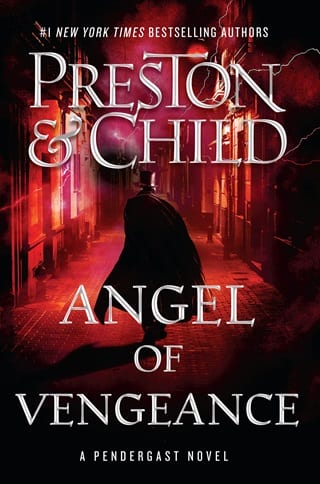70
70
D 'A GOSTA WAS HARD ON the heels of Pendergast and Proctor as they raced down into the basement, following the sound of a shotgun blast. As they reached the landing and ran down a corridor, he heard a second blast, followed by a third. The echoes died away as they approached the laboratory door. It was closed, but Pendergast shouldered it open and they stormed inside.
The room was dim. Acrid smoke filled the air. The glow of red emergency lamps flickered and danced, coming in and out of view as the haze drifted by. It stank of burnt electronics and nitrocellulose.
As D'Agosta stood, uncomprehending, Pendergast and Proctor fanned out ahead of him, their figures growing ghostly in the pall. He heard the sounds of switches being turned on and off fruitlessly. There was a loud spark, followed by a curse from Proctor. And then lights in the ceiling sprang to life—one, two—and the roar of an exhaust fan came from somewhere overhead. The light revealed Constance Greene on the floor, propped up on her knees, in a dressing gown. An overturned wheelchair and shotgun lay nearby.
"Constance!" Pendergast cried. "What happened?"
"Help me up, please," she said with a gasp.
Gently, Pendergast helped her rise as D'Agosta righted the wheelchair and eased her into it.
"Are you all right?" Pendergast asked.
"Rarely better," Constance managed to say, even as she winced in pain.
Proctor watched them silently for a moment, then approached the smoking wreckage, surveying the damage. "Mr. Pendergast?" he said, turning.
The agent looked over. Proctor silently pointed to a section of the device that had received the brunt of the blast. The central brain of the machine was a violent tangle of copper wire, bits of plastic, ruined circuit boards, and other detritus stamped with various colors and labels. The damage was so great D'Agosta could see right through the ruined guts of the machine to the wall behind, peppered with shot.
"It's finished," Proctor murmured, almost to himself.
There was a brief silence as Pendergast came over and the two men surveyed the damage. Then Pendergast turned back to Constance, looking at her silently.
"Why did you destroy the machine?" he asked after a moment.
"Because none of you would," came the reply.
"Before that first shotgun blast, I thought I heard the faint sound of a raised voice. Who…?" Pendergast stopped, looking most uncharacteristically baffled.
"Leng," she said.
"What?"
"He—" She paused, closed her eyes, and took a moment to regain her breath. "He came through. He wanted something."
"And?"
"I let him have it."
This was followed by another silence, during which Proctor knelt to pick up the shotgun. He turned it over in his hands, then racked the slide a couple of times. Two shells sprang out, which he picked up and put in his pocket. Then he leaned the weapon against the wall and turned toward Pendergast. An odd look passed between them. Pendergast's glance shifted to the shotgun, then the portal, and finally to Constance, his eyes glittering with growing understanding.
Then he returned to the wheelchair and gently gathered her into his arms. "I'm taking you back to bed," he said in a low voice that sounded not quite paternal, and not quite fraternal. "Vincent, if you wouldn't mind getting the door and assisting with the elevator, please?"
"You got it." D'Agosta moved to the exit, holding the door open. "What—" He hesitated. "What are we going to tell Mime?"
Pendergast made a pained face. "Later, my friend." Cradling Constance, he walked toward the door.
As he did so, D'Agosta saw Constance bring one hand up to caress Pendergast's cheek. At the same time, she raised her head to murmur something in his ear. D'Agosta, embarrassed, looked away, but heard her words nevertheless: Thank you for bringing me home .
"Proctor," Pendergast said over his shoulder, "if you wouldn't mind making sure this mess is stabilized and not about to burst into flame, before following us back upstairs?"
"Of course."
"Much obliged." And Pendergast vanished around the corner and into the hallway, D'Agosta following.
Proctor spent ten minutes checking the main electrical leads and a few of the more unstable components, satisfying himself that the thing was inert—and would stay that way. Task accomplished, he made a circuit of the room, his flashlight illuminating every corner. He picked up the empty buckshot shells and pocketed them with the others. Then, as he rose in preparation to leave, he noticed three small droplets of blood. They were at the base of the platform where the portal normally appeared. Dipping a hand into his jacket pocket, he pulled out a handkerchief, knelt, and carefully wiped them away.
"Neatly done, Constance," he murmured in a low, admiring voice, as he returned the handkerchief to his pocket. "Very neatly done indeed."
Then he rose, turned off the emergency lighting, stepped over to the door, exited, locked it behind him—and vanished into the gloom of the basement hallway.
 Fullepub
Fullepub 



